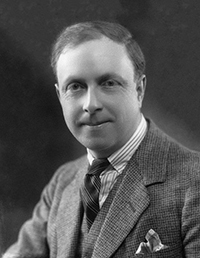
Archibald Joseph Cronin – better known simply as A.J. Cronin – lived from 19 July 1896 to 6 January 1981. He was one of the most commercially successful Scottish writers of the 20th Century. The wider picture in Scotland at the time is set out in our Historical Timeline.
Cronin was born in Cardross in Dunbartonshire. He was an only child of a Catholic father and a Protestant mother, and was brought up by his mother as a Catholic after the death of his father. Religion was something that mattered more than it should have done in West Central Scotland at the time, and he talked years later of "A feeling of social inferiority... a sort of spiritual wound deriving from my religion."
He attended Dumbarton Academy and his obvious abilities won him a scholarship to study medicine at Glasgow University, where he met his wife, another medical student, Agnes Gibson. Cronin interrupted his studies to serve as a surgeon in the Royal Navy in the closing stages of World War I, then returned to Glasgow to graduate with the first of a string of medical degrees and honours, he was to achieve over the next few years.
In the early 1920s Cronin moved to South Wales to take up a post as a GP, and in 1924 he was appointed Medical Inspector of Mines for Great Britain. Later in the 1920s he established a successful practice in London. In 1930 he spent three months recuperating from ill health in the Highlands and during that time wrote his first novel, "Hatter'sCastle", which became an immediate success when published the following year.
Cronin never returned to medicine, turning instead to full time writing. Over the next four decades he produced a steady flow of novels and articles, many of which also went onto achieve great success. Perhaps his most influential book was "The Citadel", published in 1937. In it he drew on his medical background in the South Wales coalfields and in Harley Street to highlight the huge inequalities that existed in health provision in Britain at the time. "TheCitadel" is often credited as the inspiration for the National Health Service, introduced in Britain in the years following the Second World War: and more widely the gritty social realism of Cronin's novels was believed by many to be an important factor in bringing about the land slide victory of the Labour Party in the 1945 UK General Election.
In the late 1930s Cronin moved with his wife and three sons to Connecticut in the USA. After the war he divided his time between the USA and Southern France, before moving to Switzerland in the 1950s, where he continued to write until not long before his death in 1981.
Nazira Artykbayeva, librarian of the International Book Department

